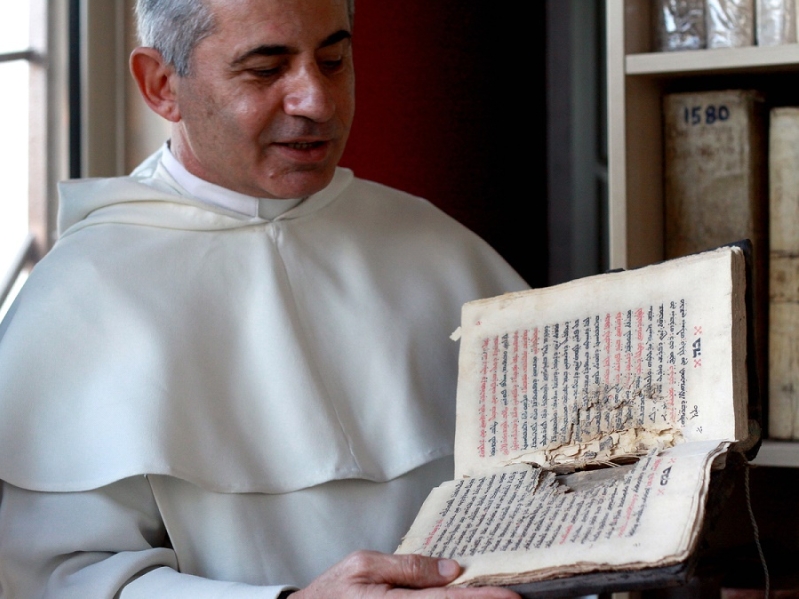
A small group of Benedictine and Dominican monks living in the northern Iraqi city of Erbil are working tirelessly to preserve what is left of ancient Christian manuscripts after members of the Islamic State extremist group destroyed many of the priceless pieces.
Last summer, when ISIS began approaching Qaraqosh, Father Najeeb Michaeel fled the city in the middle of the night with thousands of other Christians and religious minorities.
But before fleeing, Father Nageeb made sure to send a collection of 1,300 ancient Christian manuscripts and antiquities, which he had been digitizing, ahead in a vehicle, ensuring they were safely out of ISIS clutches.
"We passed three checkpoints without any problem, and I think the Virgin Mary [had] a hand to protect us," he told NPR.
Today, Father Nageeb lives in a monastery in Erbil, parallel to a refugee shelter where many of his Christian brothers and sisters live, also forced to flee their homes. The books he risked his life to preserve are stored safely in a well-lit room, tucked into the monastery, where he and several other monks continue to digitize them.
"The father or mother try to save the first thing - the children," he explained. "So these books [are] my children."
Shortly after Father Nageeb's escape, Qaraqosh, which had been home to Iraq's largest Christian community, and four other Christian-majority towns were captured by Islamic State militants. The insurgents stripped all churches of ancient relics and murals, smuggling and destroying much of their plunder.
The priest fears that the 50,000 regular books he was forced to leave behind were also destroyed by ISIS, but is thankful for the history he was able to save.
"If I hadn't transported and kept the manuscripts, they would have been destroyed like so many churches and monasteries in Mosul and the Nineveh plain," Father Nageeb said.
According to Jay Sekulow of the American Center for Law and Justice, ISIS' demolition of the religious artifacts is to culturally cleanse Iraq and Syria of religions other than Islam.
"ISIS has a stated goal to wipe out Christianity," Sekulow, who also authored "Rise of ISIS: A Threat We Can't Ignore," explained.
"This why they are crucifying Christians -- including children -- destroying churches and selling artifacts. The fact is, this group will stop at nothing to raise funds for its terrorist mission."
Fr. Columba Stewart, executive director of the Hill Museum & Manuscript Library in Collegeville, MN, who works to preserve religious artifacts, emphasized the historic significance of the manuscripts.
"Many of these texts were things that were not printed until fairly recently...particularly in some of the more isolated regions, they continued to actually copy books by hand until very, very recently," he told CSNNews.
"It's our only access to their history, to the history of these particular communities," he emphasized. "You can infer things from archeology or buildings and you have world history for recent generations, but for the deeper history of centuries, it's all contained in these manuscript materials.
"These are communities that have been kind of evaporating from pressure because they're minority groups," Fr. Stewart added.. "A lot of them have immigrated already now they've been pushed out of their villages where they've lived since the 4th century, 5th century.
"So these are really ancient peoples, now displaced, [who] don't know if they're ever going to go back."
Meanwhile, Father Nageeb says he he will continue to help fellow believers and preserve Iraq's rich history.
"I want to be there to help people-especially the handicapped, the homeless, and families who are in trouble-not just with material things but also to help give them direction, power, and faith. We are there supporting each other, walking together, falling together," he said.
"We trust in God, and we believe that God is good. We also believe in doing good to each other. There are many minorities in Iraq, and most of them are afraid. Many things are good in Iraq, but they are hidden. We are scared to do good to each other because so much has been destroyed. But many people want to do what is good, to rebuild Iraq, and to prepare for the future."







